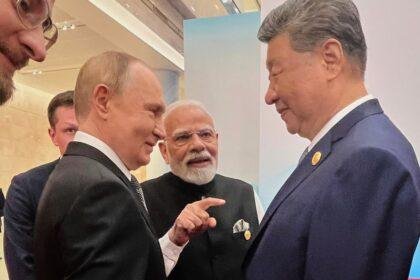House Speaker Mike Johnson Advocates for Sanctions Against Russia Amid Ongoing Conflict
Washington, D.C. – In a significant political development, House Speaker Mike Johnson has publicly endorsed the imposition of “overdue” sanctions on Russia, aligning with a growing bipartisan sentiment in Congress. This call for action comes as the conflict in Ukraine escalates, with Russian forces intensifying their military operations.
Bipartisan Support for Sanctions
During an appearance on CBS News’ “Face the Nation,” Johnson, a Republican from Louisiana, emphasized the urgency of the situation. “Desperate times call for desperate measures,” he stated, underscoring the need for appropriate sanctions against Russia. His remarks follow a push from Senator Lindsey Graham (R-SC) and Representative Brian Fitzpatrick (R-PA), who have advocated for attaching sanctions to upcoming legislation aimed at preventing a government shutdown.
Johnson’s support reflects a broader consensus among lawmakers who believe that the current sanctions regime is insufficient to deter Russian aggression. “There’s a big appetite for that in Congress,” he noted, expressing eagerness to collaborate with both the White House and Senate colleagues to advance the sanctions package.
Historical Context of U.S.-Russia Relations
The call for sanctions is not new; it echoes a long history of U.S. efforts to counter Russian expansionism. Since the annexation of Crimea in 2014, the United States and its allies have imposed a series of economic penalties aimed at crippling the Russian economy. However, the effectiveness of these sanctions has been a topic of debate among policymakers and analysts.
The current conflict in Ukraine has reignited discussions about the need for more robust measures. A bipartisan group of senators, including Graham and Senator Richard Blumenthal (D-CT), previously introduced a sanctions package that has garnered support from approximately 85 co-sponsors. This proposed legislation aims to impose secondary tariffs on countries that continue to purchase oil from Russia, targeting a crucial revenue stream for the Kremlin.
The Role of the Executive Branch
While Johnson’s enthusiasm for sanctions is evident, he acknowledged the necessity of presidential approval for any legislative action. “Congress really can’t do this on its own volition because, of course, the President would need to sign whatever we do into law,” he explained. This highlights the intricate balance of power between Congress and the executive branch, particularly in matters of foreign policy.
Former President Donald Trump has previously expressed skepticism about legislative sanctions, suggesting that he could impose penalties through executive action. However, his recent statements indicate a shift in tone, as he has called for NATO allies to join in a coordinated sanctions campaign against Russia. This change may reflect the mounting pressure from both domestic and international stakeholders to take a firmer stance against Russian aggression.
The Impact of Sanctions on the Conflict
Ukrainian President Volodymyr Zelensky has been a vocal supporter of increased sanctions, viewing them as essential to undermining Russia’s military capabilities. The ongoing conflict has resulted in significant humanitarian crises, with millions of Ukrainians displaced and countless lives lost. As the situation deteriorates, the urgency for effective sanctions becomes increasingly apparent.
Despite the potential benefits of sanctions, there are concerns about their long-term effectiveness. Critics argue that sanctions can sometimes lead to unintended consequences, such as strengthening the resolve of the targeted regime or harming ordinary citizens more than the political elite. The challenge for U.S. lawmakers will be to craft a sanctions strategy that maximizes pressure on the Kremlin while minimizing collateral damage to the Russian populace.
The Political Landscape
Johnson’s advocacy for sanctions comes at a time when he is navigating a complex political landscape. Last year, he faced significant opposition from within his party, particularly from far-right members like Representative Marjorie Taylor Greene (R-GA), who opposed substantial aid packages for Ukraine. Johnson’s ability to unite his party around the issue of sanctions could be pivotal in shaping U.S. foreign policy moving forward.
The upcoming legislative session will be crucial for determining the trajectory of U.S. sanctions against Russia. With a government shutdown looming, lawmakers will need to balance domestic priorities with international obligations. Johnson’s willingness to engage with both sides of the aisle may facilitate a more unified approach to addressing the crisis in Ukraine.
Conclusion
As the conflict in Ukraine continues to escalate, House Speaker Mike Johnson’s call for sanctions against Russia underscores a critical moment in U.S. foreign policy. With bipartisan support growing and the urgency of the situation becoming increasingly clear, lawmakers face the challenge of crafting effective measures that hold the Kremlin accountable while fostering international cooperation. The coming weeks will be pivotal in determining how the U.S. responds to this ongoing crisis, and whether Johnson can rally support for a comprehensive sanctions package that addresses the complexities of the situation.











